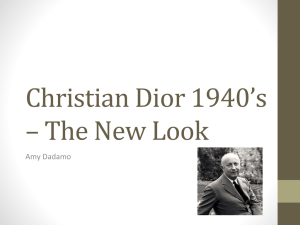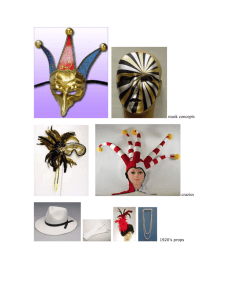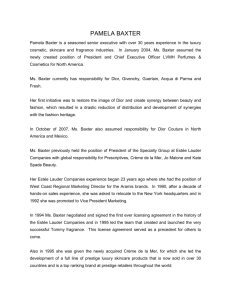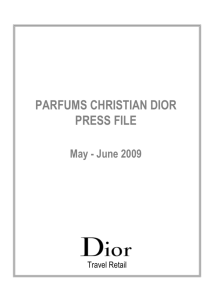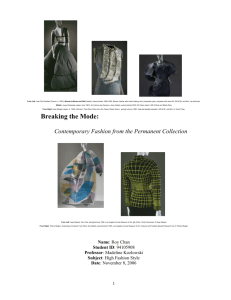Dior article - Kickshaw Productions
advertisement
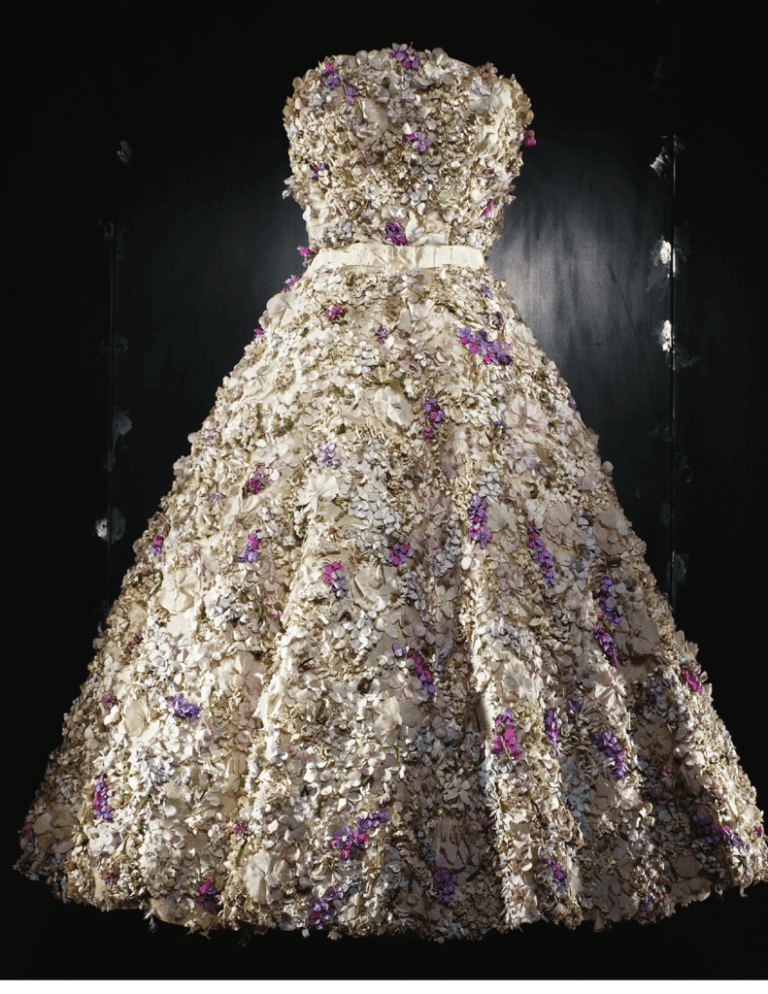
48 The EPITOME of ELEGANCE COURTESY OF DIOR THE VISION OF DESIGN ICON CHRISTIAN DIOR ENDURES ACROSS THE DECADES. BY LOIS ELFMAN “The House of Dior stands for absolute elegance,” says Dennita Sewell, curator of fashion design for the Phoenix Art Museum. “It has always stood for excellence and extravagance in terms of use of textiles.” It has been 54 years since Dior’s founder, Christian Dior, died of a heart attack at the age of 52. He headed up the eponymous fashion house for a little more than a decade, but the 22 collections he produced remain etched in fashion consciousness, and the House of Dior continues today. Singular Vision “Christian Dior had a very clearly defined vision when the house was established,” says Pamela Baxter, president and CEO of both Christian Dior Inc. and LVMH (Louis Vuitton-Moet Hennessy) Perfumes and Cosmetics North America. “He had a set of codes for the house and those codes are honored no matter who the designer is.” Among those codes was a reverence for flowers and gardens, resulting in the many floral Dior patterns to bloom on the runway over the years. He also loved feminine details like draping and bows, which continue to adorn the label to this day. A very special Dior grey is seen in every Dior boutique around the world. The Dior line eventually encompassed fragrances, lipsticks, accessories and ready-to-wear clothing. Jonathan Walford, curatorial director of the Fashion History Museum in Cambridge, Ontario, says Dior isn’t sufficiently recognized for the brilliant businessman he was. “He knew that ultimately the real money would be in off-the-rack design and accessories,” Walford says. “He nevertheless understood that haute couture was crucial for marketing and selling his label.” The Man Christian Dior was born in 1905 in Granville, France. According to the company’s official bio, his wealthy, bourgeois family moved to Paris when Christian was 5. His early career ambition was to be an architect; then, at age 23, he opened a contemporary art gallery with friends. Three years later, the Dior family lost their wealth due to the Wall Street crash, as did Dior’s partner in the gallery. Dior became a fashion illustrator and sold his sketches to publications and fashion houses, eventually becoming an in-house modéliste (designer) for two design houses. In 1946, he was introduced to textile magnate Marcel Boussac, which THE ST. REGIS MAGAZINE FALL 49 50 WALD led to the creation of his own couture house. Dior’s first Paris establishment, the Christian Dior Fashion House, at 30 Avenue Montaigne still exists today. From the time it launched in 1947, Dior’s work received great attention; his “New Look” collection quickly defined post-war fashions for upscale women. “The ‘Bar’ suit for women is indisputably one of the most significant items of the 20th century of any designer,” says Sewell of the iconic New Look ensemble. “His wonderful suits carried the look of the day for a good period of time. He was the dictator of what the length of the skirt was, of what the silhouette was. “The glorious ball gowns like Venus (1949) and Junon (fall/winter 1949 - ’50) were incredibly extravagant and beautifully designed, and really stand as markers of that type of work in an era where it was the peak of haute couture,” she adds. “It was [an era] rich in terms of energy. It was was thriving and he defined the look of that era.” “He was very much into the detail of every garment that he made,” Baxter explains. “He believed that the inside of the garment—that really no one saw but the woman who wore it—needed to be as beautiful as the outside.” Knowing the inside of her gown was as intricately designed as the outside, Baxter says, was an inner secret that radiated outward, making a woman stand taller, feel more feminine and exude confidence. “[Because of this detail], she knew she was beautiful all the way through,” she adds. By the end of 1947, le premiere parfum called Miss Dior had launched in France and internationally. As it was Dior’s belief that fragrance and clothing were intertwined, he later designed a Miss Dior dress, reminiscent of the flowers in the perfume. “They used to hold fashion shows right in the salon,” Baxter says. “Dior would pick lillies of the valley and stitch them into the hems of the dresses so that when the models walked and twirled you would smell lily of the valley in the salon.” Dior knew that he had a large fan base in the JUNON BALL GOWN U.S. and therefore traveled to the States to promote his work. In 1948, a Christian Dior showroom opened in New York City. By 1951, the Christian Dior Fashion House employed 900 people internationally, and that number blossomed over the next few years. Celebrities were soon seen wearing Dior creations, adding to the label’s prestige. Shoes, accessories and giftware continued to grow, and reflected Dior’s personal style and interest in his collections. The legendary perfume Diorrissimo debuted in 1956. “Dior recognized that fashion was fickle and that you were only as good as your last collection,” Walford says. “He constantly reinvented the silhouette and altered the length of the hemline. “Most importantly, Dior recognized that fashion was a business.” He also recognized talent, and among the young designers he hired were Yves Saint Laurent and Marc Bohan. In March of 1957, Dior appeared on the cover of Time. Before the year was over, he died of a heart attack while in Italy. Saint Laurent was appointed artistic director of Christian Dior Fashion House. He was only 21. Surviving and Thriving “Having [Saint Laurent] follow and bring the youthful element to it was really lucky for Dior’s future,” Sewell says. Later that year, former Queen and Empress of Iran Farah Diba wore a Dior dress designed by Saint Laurent for her marriage to the Shah of Iran. The following year, British-American actress Olivia de Havilland wore another one of his designs to the Oscars, but soon after, Saint Laurent was drafted into the military. Bohan, then 34, succeeded him as artistic director. Over the next decade, there was a decided shift in contemporary fashion, as designers like Mary Quant introduced more geometric and angular styles. “They denied the body’s shape, whereas Dior was all about not only embracing the body’s shape, but really accentuating the femininity,” Sewell says. Although Dior couture may have been less avantgarde, it maintained its popularity with elite fashionistas. Bohan also launched Christian Dior Homme in 1970. New boutiques opened internationally. “The name Dior was so well established in fashion and so well situated in the fashion business that it could survive because the name still had cache, even if the clothes were not on the leading edge of Paris style,” Walford says. “Dior was reinvigorated under Gianfranco Ferré (artistic director from 1989 - ’97) and was then reinvented under John Galliano (artistic director from 1997 - 2011).” Throughout the ’60s, ’70s and ’80s, Hollywood celebrities continued to showcase Dior couture. Prince Grace of Monaco wore a Dior design to the 1981 wedding of Lady Diana Spencer and Prince Charles. Bohan also designed costumes, like those worn by Elizabeth Taylor and Mia Farrow in the film “Secret Ceremony,” and for Brigitte Bardot in “L’Ours et la Poupée.” Artistic Director Gianfranco Ferré’s approach brought the Dior name back into cutting-edge fashion. In 1995, the now iconic Lady Dior handbag debuted when Madame Jacques Chirac presented the very first one to Princess Diana during her inauguration of the Cézanne exhibition at the Grand Palais in Paris. Princess Diana also helped propel Artistic Director John Galliano’s couture designs to the forefront of fashion when she wore his first Christian Dior design to a gala at the Metropolitan Museum LIVING LUXURY The St. Regis New York opens a new Dior Suite. The moment guests step into the entry vestibule of The St. Regis New York’s new Dior Suite the style is unmistakable. The walls bear the signature Dior grey tone lit by a basket crystal chandelier and sconces that incorporate the Dior signature bow in their design. Designed by Caroline Rippeteau, senior designer, global brand design for Starwood Hotels & Resorts, and former colleague Bree Dahl, the 1,500-square-foot suite is reflective of Dior in every way. During the design process, they referenced books on the history of House of Dior and carefully studied all aspects of fashion, textiles, materials and trends from the early days of the couture house to the house as it exists today. “As part of the design process, we constantly referred to and collaborated with the Dior brand team for their feedback and approval,” Rippeteau says. “At the suggestion of the Dior team, I also visited the original Dior atelier on the Avenue Montaigne in Paris to experience first-hand the most recent Dior retail design by Peter Marino.” The suite has one bedroom, a living room, dining room, one full bath and a powder room. Rippeteau and Dahl designed and selected elements that honored the Dior fashion house. By example, all drawers in the custom furniture pieces are lined with Dior grey felt. A Lady Dior graphic pattern is etched on the glass mirror top of the bedroom dresser. Beaux-Arts wall and ceiling mouldings reflect the original Dior atelier. Upholstery is plush, yet tailored, in shades of Dior greys and blush pinks. On the living room sofa are throw pillows featuring fashionable fabrics and decorative fringe in a nod to Dior fashion. The bedroom walkin closet has wall covering in a lace pattern with rose hues. “The backs of the dining chairs are upholstered with a mix of fashion fabrics like toile and sheer lace, which is a contrast to the upholstery elsewhere on the chairs,” Rippeteau says. “The white lacquer carved wood frame and plush grey upholstered sofa and arm chair designs in the living room are a direct nod to the furniture in the Dior atelier on the Avenue Montaigne. The grey carpeting throughout the suite is a match to the grey carpeting used in the Dior retail stores.” Bil Donovan, resident Dior painter for cosmetics, painted a 5-by-9-foot watercolor on canvas for the living room that pictures four ladies dressed in Dior designs. Two of the figures are wearing designs from Christian Dior himself. Another figure is donning an outfit by Marc Bohan, artistic director of Dior from 1960 - ’89, and the final figure is wearing a creation of Gianfranco Ferré, artistic director from 1989 - ’97. “The St. Regis brand is an established icon of luxury with a heritage of tradition, innovation and luxury as reflected by The St. Regis New York being a choice for Christian Dior originally and more recently hosting shows by fashion designers Jason Wu and Wes Gordon,” Rippeteau says. “This designer suite provides an interior exploration of this passion for fashion design.” THE ST. REGIS MAGAZINE FALL 51 PHOTOS BY KEN HOWIE Christian Dior, French (1905-1957). Evening Dress, Spring 1957, silk faille taf- Christian Dior, French (1905-1957). Ball Gown, 1952, silk satin with metallic embroidery. Collection of Phoenix Art Museum, Gift of Mrs. Lois Alberts. feta. Collection of Phoenix Art Museum, Gift of Mrs. Donald D. Harrington. of Art; the event marked the opening of an exhibit that celebrated the 50th anniversary of the Dior Fashion House. Nicole Kidman wore Dior by Galliano to the 1997 Academy Awards. His first ready-to-wear women’s collection was for fall/winter 1997 - ’98. Dior hit the Web in 1999 with the launch of dior.com. In the same year, the extraordinarily popular J’adore perfume was born; Charlize Théron became the face of J’adore in 2004 and remains so to this day. The 21st century welcomed the first menswear collection from Hedi Slimane (then creative designer for men’s clothing), and the Dior Men’s Boutique reopened in Paris. Galliano was named “Commander of the British Empire” by Queen Elizabeth II in Buckingham Palace in 2001, in recognition of his services to the fashion world. His designs subsequently gained even more popularity with celebrities. 52 The collection he sent down the runway in 2006, inspired by medieval love and war utilized the look of armor and created quite a stir. “We had some pieces on view here. They were so dramatic and larger than life,” Sewell says. “People loved that they were couture and yet they had a great deal of fantasy to it. Those truly spawned interest from young people as well.” Commercials and print ads for Miss Dior Cherié, featuring Academy Award winner Natalie Portman, debuted earlier this year and received an overwhelmingly enthusiastic response. Dior’s Enduring Presence The Phoenix Art Museum hosts special luncheons where they bring out pieces from the vault. At one such luncheon, Sewell recalls, guests gravitated towards the vintage creations from Dior’s early collections, which have an ethereal quality. “People respond to the beauty,” she says. “These pieces are fairytale-like.” What keeps these designs so iconic, she explains, is the imagery captured in magazines of the day—photos and illustrations. “The clothes, the designer, his extreme creativity and the photographs,” she says. “That really defined the height of elegance and the height of couture, I think, for the 20th century.” When Reese Witherspoon won her Oscar for “Walk the Line,” she wore a 1950s vintage gown by Dior himself. At press time, a new artistic director was in the works, but Dior himself continues to influence the brand. “We feel like he’s here,” Baxter says. His presence is constantly reaffirmed. In keeping with this timelessness, a new watch, Dior Huit, was recently launched. “Dior is very elegant, very flattering to a woman’s body,” she adds. “Timeless.”

